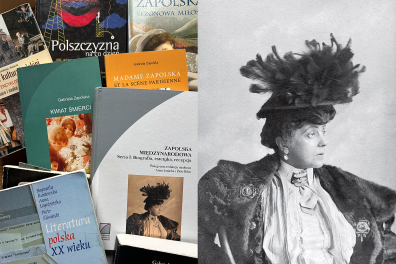The Polish Studies Section at the heart of a European project on Gabriela Zapolska: language, culture and intercultural transmission

At the heart of the project lies an essential dimension: mobilizing Gabriela Zapolska's literary creation in the learning of Polish as a foreign language. The aim is to make glottodidactic use of the linguistic, stylistic and cultural richness of her work, integrating the feminine dimension, cross-border energy and strong educational value of her texts.
The project is also based on a decisive geographical anchorage. Zapolska was born and raised on her family's estate in Kiwerce/Podhajce, near Łuck/Loutsk in Volhynia. Lwów (now Lviv, Ukraine) appears frequently in her texts and correspondence; Paris was the site of five years of intense work, where she developed a modern journalistic style akin to reportage; Vienna was the site of her great dramaturgical successes, where Austrian critics hailed her as an innovative author introducing modernity to what were still highly conventional stages. The Austrian capital is also a crucial location in the plot of Kwiat śmierci, the first crime novel written by a woman in Polish literature, which further enriches the translocal and transcultural dimension of the project.
This positioning allows for differentiated pedagogical approaches depending on the partner countries: a "Zapolska lwowska" for Ukrainian students; a "Zapolska viennoise" for Austrian students; and a "Zapolska parisienne" for French students. The common starting point will be a webinar entitled "Universal Zapolska", which will serve as a theoretical matrix before local declinations are explored.
The pedagogical activities will unfold in three complementary stages:
- An introductory course, linking Zapolska's work and biography to a specific place or cultural context (Paris, Lwów/Lviv, Vienna);
- Polish as a Foreign Language sessions, based on her texts as grammatical, lexical, discursive and cultural supports, enabling all language skills to be worked on;
- LARPs (immersive role-playing games), moderated by coordinators from the University of Białystok, which will offer students an interactive learning experience based on the staging of situations, characters and environments from the Zapolskian universe.
Designed as a space for exchange between universities and cultures, the project* intends to explore the linguistic, cultural and pedagogical potential of the work of Gabriela Zapolska - a major writer of Polish modernity, a daring female figure and a European before her time. Through literature, the aim is to promote the learning of Polish from a transdisciplinary, creative and intercultural perspective, where the female gaze, historical experience and linguistic diversity intersect.
Selected by the NAWA (Polish National Agency for Academic Exchanges) as part of the "Promotion of the Polish Language" program, the project involves four partner institutions:
- the University of Białystok;
- the Ukrainian National University Lesia Ukrainka in Łuck/Loutsk;
- the University of Vienna (in Austria);
- and Inalco in Paris.
The program is coordinated by Professor Anna Janicka (University of Białystok), with Dr. Agnieszka Trześniewska-Nowak as principal executor. The other institutions are represented by Professor Svitlana Sukharieva (University of Łuck), Professor Przemysław Chojnowski and Assistant Professor Jolanta Doschek (University of Vienna), and Professor Piotr Biłos (Inalco). As such, it is also part of the CREE project entitled Forms, experiences and the quest for freedom: Polish literature in a global context.
The program's objectives are manifold:
- to disseminate Gabriela Zapolska's work among learners of Polish as a foreign language;
- to develop innovative and interactive teaching methods (LARP, workshops, field activities);
- to enrich the pedagogical offer for levels B1-B2;
- to promote Polish culture within a European and transcultural framework (Paris, Lwów/Lviv, Vienna);
- to strengthen international didactic and scientific cooperation.
Thus, the project makes literature a living vehicle for encounters between European languages, memories and imaginaries, while embedding Polish culture in a dynamic of exchange, pedagogical innovation and mutual understanding.
* Projekt ma na celu glottodydaktyczne wykorzystanie potencjału kobiecego i transkulturowego, jaki niesie ze sobą twórczość Gabrieli Zapolskiej - pisarki mającej w literaturze i kulturze polskiej status klasyka.